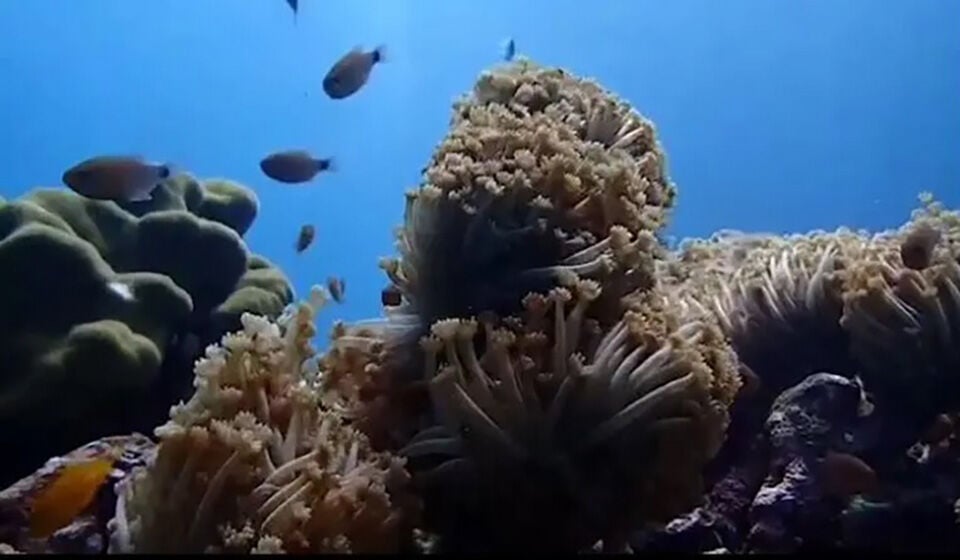Coral catastrophe strikes Krabi’s Mu Ko Lanta Marine Park

In a recent survey conducted by park officials, alarming findings have surfaced regarding coral bleaching in the pristine waters of Mu Ko Lanta Marine National Park in Krabi.
Officials took the plunge to assess the extent of coral bleaching and gather marine debris littering the seabed.
Around Rok Island, a distressing 10 to 15% of corals at depths of 1 to 5 metres were discovered bleached, with hump corals bearing the brunt of the damage. Not only corals but other marine treasures like giant clams and sea anemones were also found bleached.
Venturing further into the Ha Islands revealed a similar grim scenario, with 5% of corals at the same depth exhibiting bleaching, particularly impacting staghorn and hump corals. The culprit behind this devastation? Skyrocketing water temperatures are hitting 31 degrees Celsius.
Dr Thon Thamrongnawasawat, an esteemed marine scientist from Kasetsart University, emphasised the alarming pace at which coral bleaching can occur, sometimes within a mere two days, accentuated by warmer waters.
May spells a critical time for coral survival, with reports not only limited to Koh Lanta but also extending to Koh Phi Phi. Urging a collaborative effort across all sectors, Dr Thon stressed the urgency to monitor and safeguard these vital coral ecosystems, reported Pattaya Mail.
Coral bleaching, an ominous phenomenon, sees corals expelling symbiotic algae, rendering them ghostly white. A myriad of factors including elevated water temperatures, pollution, and sedimentation contribute to this plight, leaving bleached corals vulnerable to diseases and ultimately death.
ORIGINAL STORY: Thailand’s coral reefs face grim future due to climate change
Thon Thamrongnawasawat, a veteran marine biologist with almost four decades of experience, is deeply troubled by the disturbing changes occurring in Thailand’s coral reefs He has voiced his shock and dismay at the unusual and alarming characteristics now displayed by the reefs, describing the current conditions as the most severe he has witnessed.
Thon, a professor in the Department of Marine Science at Kasetsart University, took to Facebook to share these observations. He described a time when the coral reefs teemed with vibrant life, providing shelter for a diverse array of marine creatures.
Unfortunately, the past five to six years have brought about drastic changes due to the escalating effects of global warming. Rising sea temperatures have resulted in abnormally low tides, intense sunlight, and, consequently, widespread coral bleaching.
Despite the corals’ resilience and attempts to recover, the relentless heat and solar exposure have led to the death of many, with only the sides of the coral structures managing to cling to life. Under normal circumstances, the corals could potentially recover over seven to eight years but the current environmental conditions have not been kind.
The frequency and intensity of warm water events have weakened the corals, leading to a steady decline and loss of habitat.
Thon’s posts include poignant images that serve as a stark reminder of the severity of the situation. He noted that juvenile corals, establishing themselves upon the remnants of older generations, now face an uncertain future as another bout of searing heat has bleached whatever little remained. Without a reduction in water temperatures, the outlook for these corals, and the marine life they support, appears grim.
Ecosystem impact
The crisis is not limited to a handful of reefs but extends across thousands, signalling the potential end of a multimillion-year-old ecosystem known for its beauty and biodiversity. Thon warned that unless the water temperature decreases, the marine life in Thai waters could face total extinction.
In a call to action, he urged everyone to do their part in reducing greenhouse gas emissions and to adopt environmentally friendly practices, such as reducing waste, refraining from consuming endangered species, and supporting sustainable businesses, to help combat this marine catastrophe.
The public reaction to this news has been a mix of dismay and determination. Netizens have expressed their sorrow at the sight of the dying coral reefs and the broader implications of climate change. Some feel overwhelmed by the scale of the problem, while others are committed to continuing their efforts to protect the seas, no matter how challenging it may be.
Thon’s message is clear: the time for action is now. The world must come together to address climate change and protect the oceans before it’s too late. The fate of Thailand’s coral reefs hangs in the balance, and the window of opportunity to save them is rapidly closing, reported Khaosod.
Latest Thailand News
Follow The Thaiger on Google News:


























